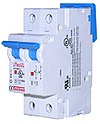Portal:Electronics/Selected article/17

A circuit breaker is an automatically operated electrical switch designed to protect an electrical circuit from damage caused by overload or short circuit. Unlike a fuse, which operates once and then has to be replaced, a circuit breaker can be reset (either manually or automatically) to resume normal operation. Circuit breakers are made in varying sizes, from small devices that protect an individual household appliance up to large switchgear designed to protect high voltage circuits feeding an entire city.
Magnetic circuit breakers are implemented using a solenoid (electromagnet) whose pulling force increases with the current. The circuit breaker's contacts are held closed by a latch and, as the current in the solenoid increases beyond the rating of the circuit breaker, the solenoid's pull releases the latch which then allows the contacts to open by spring action.
